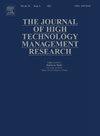Examining the impact of artificial intelligence on employee performance in the digital era: An analysis and future research direction
Q1 Business, Management and Accounting
Journal of High Technology Management Research
Pub Date : 2024-10-25
DOI:10.1016/j.hitech.2024.100520
引用次数: 0
Abstract
A new era of digital transformation has begun with the rapid integration of Artificial Intelligence (AI) technology with human management, changing traditional methods to people management. Due to the unprecedented digital transitions that businesses are seeing, AI integration in Human resource management (HRM) has become a significant area of focus. This systematic literature critically examines how AI is altering the landscape of its impact on employee performance in the HRM area in the era of digital transformation. The Scopus database, where 73 peer-reviewed articles are found These are subjected to integrated methodology of Bibliometric analysis, Content analysis, Epistemological analysis and Substantive analysis to identify the emerging themes, trends and contribution of theory in the AI impact on the employee performance in digital transformation era. The results identifies the major themes a) Digital Transformation in HRM for enhancing Efficiency b) Deep learning and neural networks in HRM c) Innovation and Technology adoption in HRM and d) Human resource investments. From the epistemological analysis results “Resource Based theory,” has been mentioned highest (4 times) and shows how HRM is evolving in the context of digital change. With 3 instances each, institutional theory with empirical study is being the most common method. Substantive analysis shows the Digital Transformation, Employee Performance, Work life balance, and Organisational change are the significant criteria, whereas sub-criteria included Innovation, performance management, and Techno stress. Additionally, it investigates the challenges and opportunities arising from how AI is incorporated into HRM procedures and its implications for workforce dynamics. The study has proposed a model of 3 major criteria and 14 sub criteria for future research actions based on substantive analysis. AI integration in HRM requires strategic planning, ethical considerations, and employee well-being. Organisations that recognise these consequences and handle issues will be more prepared for AI-driven HRM.
探讨数字时代人工智能对员工绩效的影响:分析与未来研究方向
随着人工智能(AI)技术与人力管理的快速融合,一个全新的数字化转型时代已经开启,传统的人力管理方法也随之改变。由于企业正在经历前所未有的数字化转型,人工智能与人力资源管理(HRM)的融合已成为一个重要的关注领域。本系统文献批判性地研究了在数字化转型时代,人工智能如何改变人力资源管理领域的格局,对员工绩效产生影响。在 Scopus 数据库中找到了 73 篇同行评议文章,并对这些文章进行了文献计量分析、内容分析、认识论分析和实质分析等综合方法,以确定在数字化转型时代人工智能对员工绩效的影响方面的新兴主题、趋势和理论贡献。研究结果确定了以下主要主题:a) 人力资源管理中的数字化转型以提高效率;b) 人力资源管理中的深度学习和神经网络;c) 人力资源管理中的创新和技术应用;d) 人力资源投资。从认识论分析结果来看,"资源基础理论 "的提及率最高(4 次),表明人力资源管理如何在数字化变革的背景下不断发展。制度理论与实证研究各出现了 3 次,是最常见的方法。实质性分析表明,数字化转型、员工绩效、工作生活平衡和组织变革是重要标准,而次级标准包括创新、绩效管理和技术压力。此外,研究还探讨了如何将人工智能纳入人力资源管理程序所带来的挑战和机遇,及其对劳动力动态的影响。本研究在实质性分析的基础上,为未来的研究行动提出了一个包含 3 个主要标准和 14 个次级标准的模型。将人工智能纳入人力资源管理需要战略规划、伦理考虑和员工福利。认识到这些后果并处理好这些问题的组织将为人工智能驱动的人力资源管理做好更充分的准备。
本文章由计算机程序翻译,如有差异,请以英文原文为准。
求助全文
约1分钟内获得全文
求助全文
来源期刊

Journal of High Technology Management Research
Business, Management and Accounting-Strategy and Management
CiteScore
5.80
自引率
0.00%
发文量
9
审稿时长
62 days
期刊介绍:
The Journal of High Technology Management Research promotes interdisciplinary research regarding the special problems and opportunities related to the management of emerging technologies. It advances the theoretical base of knowledge available to both academicians and practitioners in studying the management of technological products, services, and companies. The Journal is intended as an outlet for individuals conducting research on high technology management at both a micro and macro level of analysis.
 求助内容:
求助内容: 应助结果提醒方式:
应助结果提醒方式:


